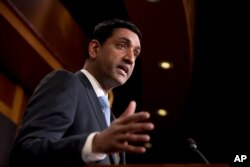The Democrat-controlled U.S. House of Representatives rebuked President Donald Trump on Wednesday and voted to cut off U.S. military assistance to the Saudi coalition fighting in Yemen.
The vote was 248 to 177 and marked the first time the House has used the War Powers Act.
The measure now goes to the Senate, which passed a similar measure late last year, setting up a possible showdown with the White House.
The United States has been providing mainly intelligence and logistical support to the Saudi-led coalition fighting Iranian-backed Houthi rebels in Yemen.
The conflict has killed thousands of civilians since 2014 and has made a dire humanitarian crisis in one of the world’s poorest nations even worse.
Saudi-led airstrikes aimed at the rebels have obliterated entire neighborhoods, destroying schools and hospitals.
U.S. lawmakers from both parties are not only disgusted by the carnage in Yemen, but many are also angry over what they see as Trump’s tepid reaction to the killing of journalist Jamal Khashoggi inside the Saudi consulate in Istanbul.
"This is their (Congress) opportunity to send a message to the Saudis that their behavior on Khashoggi and their flagrant disregard of human rights is not consistent with the American way of doing business and not in line with American values," Democratic Congressman Ro Khanna of California said.
Congresswoman Barbara Lee, another California Democrat, called the U.S. involvement in the war in Yemen “shameful,” saying it helped create a humanitarian crisis.
Congress passed the War Powers Act in 1973 after the United States’ disastrous involvement in Vietnam.
It gives Congress the authority to pull U.S. forces out of an undeclared war.
The White House said U.S. assistance to the Saudi coalition in Yemen does not fall under the War Powers Act because U.S. forces are not directly involved in hostilities.
If the Yemen resolution also passes in the Senate, the White House has threatened a veto.








